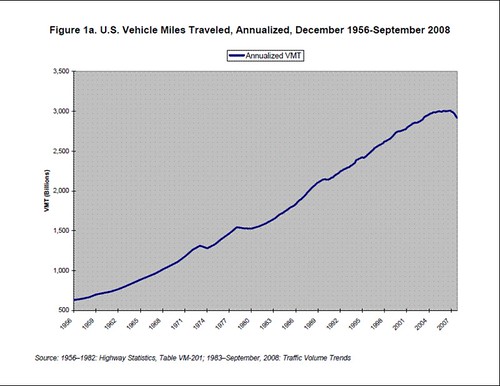We’re driving less, and it’s time for our infrastructure and built environment to adapt to the new paradigm

Posted December 19, 2008 at 1:24PM
I've written in here before that I believe that the era of unbridled sprawl and skyrocketing driving rates is over. The demise won't come cleanly and certainly not uniformly, but it is happening.
The latest confirmation comes from our very able friends at the Metropolitan Policy Program at the Brookings Institution:
"America is experiencing its longest and steepest drop in driving, signaling a permanent shift away from reliance on the car to other modes of transportation, according to a new Brookings Institution report released today. In the coming years, this shift will have far reaching implications for transportation, environmental, energy, and land-use planning.
"Entitled 'The Road... Less Traveled: An Analysis of Vehicle Miles Traveled Trends in the U.S.,' the report also presents a first-of-its kind survey which ranks all 50 states and the nation's 100 largest metro areas for their "driving footprint" and shows who drives the most, who drives the least, and where driving is declining the fastest.
"'The American driver has hit a wall,' stated Robert Puentes, author of the report and a fellow at the Metropolitan Policy Program at Brookings. 'We are now driving the same distance per year as we did in 1998.'"
The Brookings findings are consistent with data released on Friday by the Federal Highway Administration showing that the driving decline reported here for September continued in October. Here's Puentes:
"Even though gasoline prices declined sharply from September through October, drivers didn't get back in their cars. With important conversations underway on infrastructure spending as economic stimulus, it's critical for the new Congress and administration to recognize the long-term implications of these travel trends and to use this as an occasion to put forth a new vision that reflects new realities and is not just more of the same."
I couldn't agree more. But we're still driving a lot, and we have a long way to go to undo the damaging patterns we've created over the last half-century. Here's the graph for cumulative vehicle miles traveled since 1956:
We're finally trending down, and our infrastructure and development patterns need to reinforce the trend. That, of course, is exactly what smart growth does. The Brookings report recommends raising the federal gasoline tax and creating new federal mechanisms to spark innovation in places that want to link disparate transportation, housing, energy and environmental policies to create better outcomes, such as more sustainable development patterns or reduced carbon emissions.
Go here for the Brookings analysis and related goodies.
